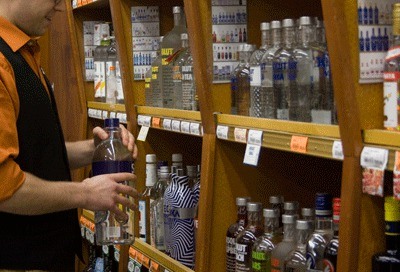By Steve Wehrly/Journal
The times, they are a-changin’ when it comes to liquor sales. But in the San Juans, maybe not so much.
Because of the passage of Initiative 1183, Washington state is getting out of the liquor business, but many of the current stores, including liquor stores on Orcas and Lopez, plan to stay in business.
Others, such as King’s Market and the Marketplace in Friday Harbor, as well as Island Market on Orcas, will be getting into the business of selling liquor for the first time and preparations are already under way.
“We’re going to be ready on June 1,” said John McBride, general manager of King’s and the Marketplace, locally owned by Valmark. McBride said aisles and shelves are being rearranged at both stores to accommodate the new inventory, and that the company is training workers and adding appropriate security measures for liquor sales.
Meanwhile, state-owned stores, including the one in Friday Harbor, are being auctioned off. Privately-owned stores (“contract liquor stores” under state law) such as Trina Olson’s Eastsound Liquor & Wine, Russell’s Liquor Store at Orcas Landing and Lopez Liquor Store, can continue in business under the initiative’s “grandfather clause”, which allows contract stores to stay open regardless of size.
The sale of liquor at what’s now the state-owned store in Friday Harbor remains possible: the store has attracted 12 bids on the internet auction site Public Surplus. The current high bid, by someone using the bidding name “Altruism,” is $2,650. Bids are expected to rise significantly between now and April 20, when the auction ends, according to Liquor Control Board spokesman Brian Smith.
Many stores in metropolitan areas are attracting bids in the tens-of-thousands of dollars, and one bidder has placed a $500,000 bid for operating rights at all state-owned liquor stores. Under conditions placed on the auction by the Liquor Control Board, if one bidder makes an offer for all the stores that is larger than the combined total of bids for individual stores, that bidder will be awarded operating rights to all the stores as a group.
Under other auction terms, the purchaser of an “operating right” for a given store must negotiate a lease extension with the property owner — but if lease negotiations fail, the holder of that operating right may open up shop at a different location up to one mile from the store and will not be bound by the initiative’s minimum size requirement.
For example, an owner of liquor store operating rights in Friday Harbor who cannot agree on a lease with the property owner, whether by making the winning bid in the auction or purchasing the rights from the winning bidder, can obtain a spirits retail license within one mile of the present liquor store without regard to the size of the store.
In Friday Harbor, King’s Market and Marketplace, both of which exceed the 10,000 square feet required by Initiative 1158, have applied for spirits retail licenses under the new law and intend to sell hard liquor in addition to beer and wine. Island Market in Eastsound also meets the minimum size requirement. It intends to get the spirits license and start selling booze on June 1, the first date for private sales permitted under the new law, a company official said.
But Aaron Dye, owner of Lopez Village Market said that he has no intention to sell spirits in competition with Lopez Liquor Store even though his store meets the size requirement. “Unless the Lopez Liquor Store falters,” Dye said.
Lopez Liquor Store, a contract store owned by Marc and Margie Zener, intends to stay in business. If it has the capital, that is. Contract stores must purchase current inventory from the state and then buy stock at wholesale market prices through distributors — plus pay new taxes mandated by the I-1183. The cost-per-unit will increase, and so will consumer prices, which might put a profit squeeze on contract stores such as Lopez Liquor Store.
In Friday Harbor, McBride said he would welcome competition from the state store by the bowling alley.
“I think competition is good and I hope somebody goes in there,” he said, adding his comment applies also to competition from a future liquor store at Roche Harbor Grocery, which has also applied for a liquor retailer license.



